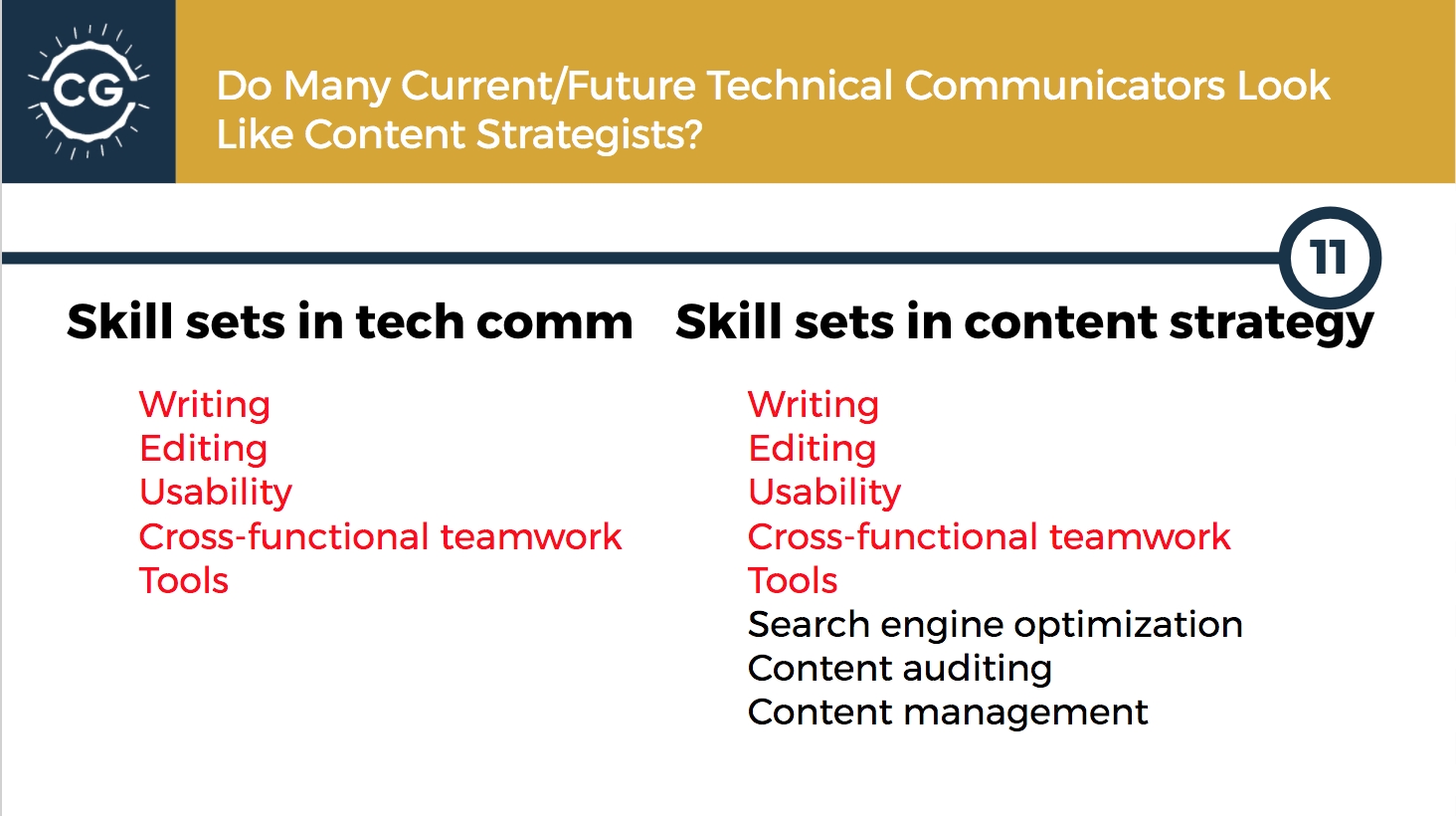Content Strategy and Technical Communication: What Does the Future Hold?
Guiseppe Getto, the President and Founder of Content Garden, was recently invited to present a keynote on content strategy and technical communication for the Washington, DC meeting of TC Camp, a technical communication unconference. In this post, he reflects on some of the key takeaways from his presentation.
Guiseppe: My presentation was somewhat provocatively titled: Content Strategy: The Future of Technical Communication? In it, I lay out emerging trends that small business owners, non-profit managers, and technical writers should pay attention to in the years to come regarding how they develop, publish, and share online content.
What Is Content Strategy?
I typically define content as useful information that people will see, so this could be any type of information you’re sharing online that is directed toward a particular audience. This can include:
- Blog posts
- Social media posts
- Ebooks
- Webpage content
- Email newsletters
- Copy for paid online ads
I define a strategy as a means of achieving a goal. Put those two definitions together and you have the following definition for content strategy, coined by Kristina Halvorson:
Content strategy plans for the creation, publication, and governance of useful, usable content.
So, content strategy is a discipline centered around how organizations develop, publish, and share online content. And for most organizations, you could add: for the purposes of attracting consumers.
What is Technical Communication?
If you’re unfamiliar with technical communication, it is a discipline devoted to the effective communication of technical or specialized topics to a variety of audiences. As the Society for Technical Communication puts it, technical communication includes communication that involves any of the following activities:
- Communicating about technical or specialized topics, such as computer applications, medical procedures, or environmental regulations.
- Communicating by using technology, such as web pages, help files, or social media sites.
- Providing instructions about how to do something, regardless of how technical the task is or even if technology is used to create or distribute that communication.
So, technical communicators work in a variety of industries, including:
- Medicine
- Science
- Technology
- Engineering
- Manufacturing
- Non-Profit Management
- Education
And they most often help organizations to develop technical content that non-specialists can understand, including:
- Help documentation for technology users
- Documentation for software developers
- Medical information for patients, physicians, nurses, and other medical professionals
- Manuals explaining engineering or manufacturing processes
How Do Content Strategy and Technical Communication Overlap?
The bulk of my presentation was devoted to areas of overlap between content strategy and technical communication. Specifically, I see a lot of technical communicators who are taking on the role of content strategist. In one of my slides, I lay out some of the shared skill sets of both disciplines as well as skill sets that are specific to content strategy:

In many ways, I think content strategy is a natural evolution of technical communication that involves producing content for online audiences. While technical writers who were working before the advent of the Internet were typically producing content for print, today’s technical writers are producing content for a variety of media, including online venues like webpages, blogs, and social media. If they’re going to do so effectively, they need to learn some new skill sets to help them create content that is appropriate to online media, specifically:
- SEO
- Content auditing
- Content management
These newer skill sets are important if you’re developing content that is going to be published online, rather than in print.
What Should Small Business Owners, Non-Profit Managers, and Technical Writers Take Away From All This?
The big take-away from all this is that organizations of all sizes should think carefully about how they manage their content. They need to have a strategy in place and need to think about how their content can do work for them. People go online to find content, to find useful information. Whether you’re a technical writer, a small business owner, or a non-profit manager, you probably have a lot of content that could be developed to help market your organization online.It’s important to mine all of the documents you have as an organization
It’s important to mine all of the documents you have as an organization, such as mission statements, charters, handbooks, etc., for information you think could be useful to your target customers, donors, or clients. Then you need to develop a plan for publishing that content that takes into account the fact that many people now want to get their information online.



Learn Content Strategy From Our Book! - Content Garden
November 13, 2019 @ 9:02 am
[…] to non-profit donors and volunteers are increasingly hungry for online content. As content grows in importance, from marketing to follow-up after a purchase, technical communicators, digital marketings, and […]